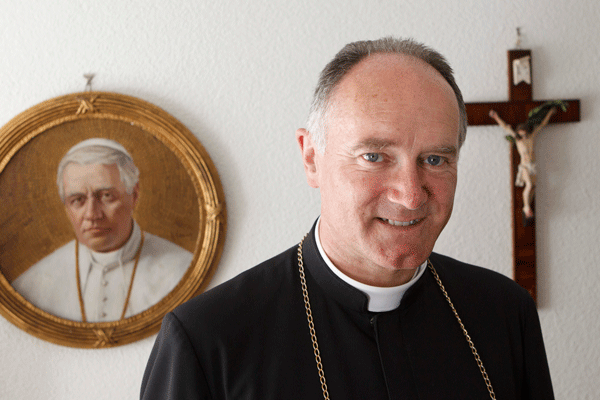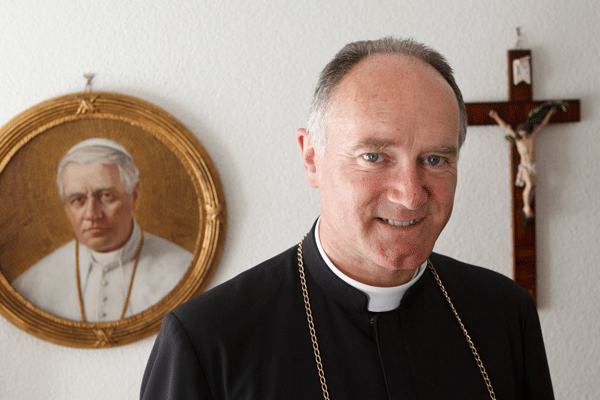
MENZINGEN, Switzerland (CNS) — Of all the controversies associated with the traditionalist Society of St. Pius X, no topic provokes stronger reactions inside or outside the church than the question of the society’s attitude toward Jews.
In 2009, after Pope Benedict XVI lifted the excommunications of all four of the society’s bishops, there was widespread outrage at revelations that one of the four, Bishop Richard Williamson, had denied the gassing of Jews in Nazi concentration camps and endorsed the notorious anti-Semitic forgery, “The Protocols of the Elders of Zion.”
The society’s superior general, Bishop Bernard Fellay, repudiated those statements at the time, saying that “anti-Semitism has no place in our ranks” and that the “position of Bishop Williamson is clearly not the position of our society.”
More than three years later, the society, a breakaway group that rejects the modernizing changes that followed the Second Vatican Council of 1962-65, may now be on the verge of reconciliation with Rome under the leadership of Bishop Fellay and over the objections of other members, including Bishop Williamson.
A prerequisite for such reconciliation is the society’s assent to certain church teachings stipulated by the Vatican in a “doctrinal preamble,” which has not yet been published but which presumably includes elements of the teaching of Vatican II. In April, the director of the Vatican press office described the society’s recent response to the preamble as a “step forward” in the process.
Yet it remains unclear whether the society’s attitude toward Jews is fully in harmony with that adopted by the church at Vatican II, specifically in the 1965 declaration “Nostra Aetate,” which said the Jewish people could not be blamed for the death of Jesus Christ and taught that they “should not be presented as rejected or accursed by God.”
“‘Nostra Aetate’ remains the charter and guide in our efforts to promote greater understanding, respect and cooperation between our two communities,” Pope Benedict told a delegation from the Latin American Jewish Congress at the Vatican May 10.
“The declaration not only took up an unambiguous position against every form of anti-Semitism, it also laid the groundwork for a theological reassessment of the church’s relationship with Judaism and it expressed confidence that an appreciation of the spiritual heritage shared by Jews and Christians would lead to ever greater mutual understanding and esteem,” the pope said.
Interviewed by Catholic News Service the following day, Bishop Fellay said the Society of St. Pius X can accept “some points” of “Nostra Aetate.”
To say that “all the Jews today are responsible for the death of our Lord is not the teaching of the church, and so this is wrong,” Bishop Fellay said. “But to say that people who agree (with the crucifixion), who say, ‘No, they were right to do so,’ there they join themselves with those who were responsible.”
The bishop added that the society teaches that “we Catholics, with our sins, we are more responsible for the death of our Lord than the Jews.”
But in contrast with the pope’s remarks, Bishop Fellay’s description of the relationship between Catholics and Jews today hardly emphasizes cooperation or friendship.
Jews “have a special place in history,” Bishop Fellay said. “Unfortunately, by their refusing of the Messiah, of Christ, that does not change that they have a special role, but for the time being this role in comparison with Catholicism is an unpleasant role.”
The relationship between Jews and Christians is a fundamentally antagonistic one, he said.
Jews “see in Christianity the cause of their situation today,” the bishop said. “If you think of what happened to them during World War II, they claim that the fault or the cause is Christianity, which we claim is wrong.”
“When you see all the comments on the Jewish side about Catholicism, you see this antagonism which does not come first from the Catholics,” he said. “I think it comes more from their side than ours.”
The bishop said that he did not attribute such an attitude to “every Jew, as people,” but to “the religion, Judaism, which is something different.”
“Not all Jews follow Judaism,” he said.
Bishop Fellay said that, despite popular perceptions fed by controversies such as the Williamson case, Judaism is not a preoccupation of members of the society.
“I don’t think that in any talk or sermon, I ever talked about the Jewish question,” he said. “It’s not an issue for us.”
Yet other SSPX members have a history of statements and publications expressing hostility and suspicion toward Jews.
The group’s founder, the late Archbishop Marcel Lefebvre, named “the Jews, the Communists and the Freemasons” as “declared enemies of the church” in a 1985 letter to Blessed John Paul II. Bishop Bernard Tissier de Mallerais, who also opposes Bishop Fellay’s efforts at reconciliation with Rome, said in 1997 that “the Jews are the most active artisans for the coming of Antichrist.”
And in 2009, shortly after the outbreak of the Williamson controversy, the society’s U.S. website (www.sspx.org) removed articles arguing that the “Jewish race brought upon themselves the curse that followed the crime of deicide,” and that the “Jewish people, if it has not converted to Christianity, will, even if it does not wish to, seek to ruin Christianity.”
The society may still be exposing its members and supporters to such ideas today.
In early May, journalists visiting the society’s international seminary in Econe, Switzerland, the burial place of Archbishop Lefebvre, saw copies of a French edition of “The Jew in the Mystery of History” on display near the entrance to a small bookshop attached to the chapel, where members of the local community also attend Sunday Mass.
The book, by Father Julio Meinvielle, an Argentine priest who died in 1973, describes the Jews as historic “enemies of the Gospel,” moved by a “satanic hatred” of Christians, whom they have systematically killed and robbed over the centuries, and whose “corruption and ruin” they continue to seek through their “domination” of world economics, politics and culture.
Justifying the “discipline of the ghetto,” which the church imposed on Jews until the “de-Christianized” modern age, the book calls for a kind of apartheid between the religions to permit the restoration of Christian civilization.
Does the book express mainstream views in the society today? CNS asked Bishop Fellay.
“Not that I would know,” he replied.
Would he endorse such views himself?
“Not like that, no,” he said.
“The topic (of the Jews) is very, very delicate, very delicate, and should be handled with the greatest care,” the bishop added. “We don’t want at all to provoke and to make unnecessary turmoil in the world.”







